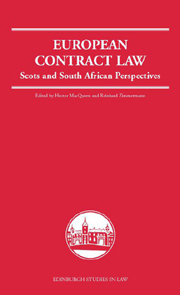Book contents
- Frontmatter
- Contents
- Preface
- List of Contributors
- List of Abbreviations
- 1 Ius Commune and the Principles of European Contract Law: Contemporary Renewal of an Old Idea
- 2 Good Faith
- 3 Offer, Acceptance, and the Moment of Contract Formation
- 4 The Battle of Forms
- 5 Agency
- 6 Threats and Excessive Benefits or Unfair Advantage
- 7 Interpretation
- 8 Third-Party Contracts
- 9 Payment
- 10 Specific Performance and Special Damages
- 11 Termination for Breach of Contract
- 12 Assignment
- 13 Capitalisation of Interest
- Appendix: The Principles of European Contract Law
- List of Cases
- Index
1 - Ius Commune and the Principles of European Contract Law: Contemporary Renewal of an Old Idea
Published online by Cambridge University Press: 05 July 2013
- Frontmatter
- Contents
- Preface
- List of Contributors
- List of Abbreviations
- 1 Ius Commune and the Principles of European Contract Law: Contemporary Renewal of an Old Idea
- 2 Good Faith
- 3 Offer, Acceptance, and the Moment of Contract Formation
- 4 The Battle of Forms
- 5 Agency
- 6 Threats and Excessive Benefits or Unfair Advantage
- 7 Interpretation
- 8 Third-Party Contracts
- 9 Payment
- 10 Specific Performance and Special Damages
- 11 Termination for Breach of Contract
- 12 Assignment
- 13 Capitalisation of Interest
- Appendix: The Principles of European Contract Law
- List of Cases
- Index
Summary
INTRODUCTION
This paper will focus on a key document within the process of the Europeanisation of private law legal scholarship, the Principles of European Contract Law. I would like to demonstrate that these Principles can be seen as a contemporary manifestation of a genuinely European tradition – a tradition which used to be labelled ius commune. And I would like to argue that they can serve as a catalyst for a Europeanisation of private law “from within” and “from below” (as opposed to European legal unification by means of legislation, i.e. unification “from outside” and “from above”). In a way, therefore, the Principles mark the contours of a new European ius commune and can fulfil a function resembling that of its historical predecessor. Before these arguments can be developed a few words have to be said about the Principles of European Contract Law and about the old ius commune. It should also be noted, at the outset, that this paper does not deal with private law in general but merely with one of its constituent elements: the law of contract. One reason for this is immediately obvious: the Principles of European Contract Law constitute the most advanced and internationally most widely noted academic project aiming at the Europeanisation of private law. Similar sets of Principles for other areas of the law are only just beginning to be published. This is hardly accidental. For, on the one hand, the law relating to commercial contracts has often tended to be the pace-maker for legal harmonisation.
- Type
- Chapter
- Information
- European Contract LawScots and South African Perspectives, pp. 1 - 42Publisher: Edinburgh University PressPrint publication year: 2006

